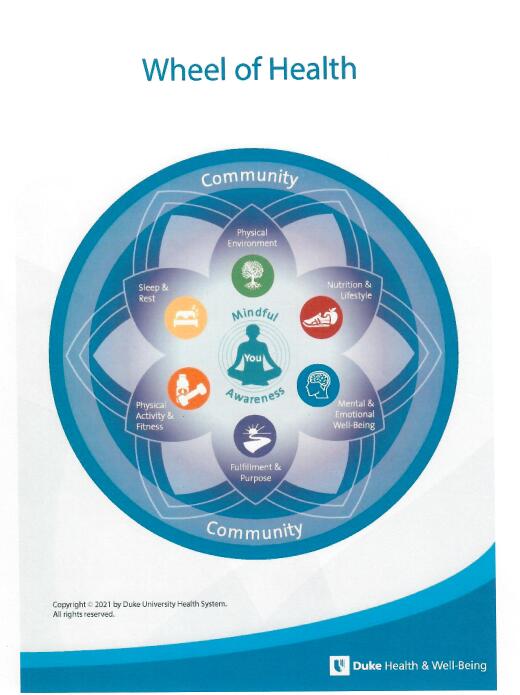Offering integrative health coaching to empower people to take charge of their own health to live happier, healthier lives
What is Integrated Health Coaching?

Integrated health coaching (often referred to as health and well-being coaching) is a process using proven techniques to enhance a person’s physical and/or emotional well-being by supporting changes in habits related to nutrition, physical activity and fitness, sleep, mental and emotional well-being, physical environment, and meaning and purpose. It holistically considers all of these areas when examining the challenges you are facing and what you would most like to change. Duke’s Wheel of Health illustrates these different areas with you at the center and takes into consideration how your community and self-awareness are interconnected with these dimensions of health and well-being. A balance among these is important for a well-rounded and balanced lifestyle.
Health coaching involves a process by which a partnership is created between a coach and client. Through this partnership, we examine your optimal vision of health, and identify the areas in which you are currently facing challenges and want to strengthen. We progress into setting goals that are attained over time by making small, gradual changes that fit into your busy life, culminating in the establishment of new, healthier habits and patterns that align with the life you would like to be living.
Examples Of Areas I Can Help You With:
— Strategize how to implement or follow through on a doctor’s or other health professional’s recommendations
— Reach physical fitness goals such as lowering blood pressure, losing weight, reducing blood sugar levels, or becoming more physically active
— Reach your nutritional goals
— Smoking cessation
— Enhance your emotional well-being such as by increasing confidence or lowering stress
— Live with more meaning and purpose
— Any aspect of your life that has an impact on your health and well-being
As We Work Together We Will:
— Explore your vision of optimal health, identifying areas in which you are currently facing challenges and want to make changes
— Determine where you would like to focus
— Set goals that are realistic and attainable
— Create a plan that involves making small, gradual changes to establish new, healthier patterns
— Create systems of support and accountability to assist you as you implement your plan
— Follow up over a determined period of time until your new routines become set habits and your new normal
About Me
Wendy Wolfson, Certified Integrative Health Coach, M.A. Developmental Psychology

I am a Certified Integrative Health Coach, trained at Duke Health and Well-Being, and am currently working towards my National Board Certification. I help facilitate behavior change with the belief that each person is capable of making meaningful, positive, and sustained changes in their health.
I hold a Master’s Degree in Developmental Psychology in which I took special interest in positive coping strategies, how to apply these to real life and how our existential beliefs and outlook affect coping and psychological health. For several years, I worked as a vocational rehabilitation counselor, and participated in research at the University of California, San Francisco.
Throughout my work, in both vocational rehabilitation and research, I was able to witness how the individuals I worked with, facing difficult life circumstances, coped with and handled challenges and hardships, often achieving a new level of insight and functioning. Working with and helping people has been a life passion and inspired me to pursue training as a Health and Well-Being Coach in order to assist individuals in transforming their health to live the life they want.
Frequently Asked Questions
What is the difference between Health and Well-Being Coaching and Life Coaching?
A health and well-being coach’s approach considers a wider, more holistic look at the overall health and well-being of an individual than a life coach’s approach, which focuses on specific elements of a person’s life, such as finances, career development, communication skills, and relationships, though there is some overlap.
Is Health and Well-Being Coaching like therapy or counseling?
Health and well-being coaching is very different from therapy. Therapy is often a reflective process that attempts to address emotional well-being by examining and healing the past and a therapist will also diagnose and treat mental illness. In contrast, health and well-being coaching is very forward-focused and action-oriented and a health coach will never diagnose or treat mental illness. Though we may use one’s past to inform where one is currently, the focus is on the here and now and what one wants to accomplish. We assess where a client is now versus where they want to be and working together formulate specific and realistic action plans to get there.
Is a Health Coach like a regular coach?
A health coach is different from a regular coach. Rather than telling clients what to do or providing training or directives, a health coach asks questions and guides clients in conversations to provide insight into their own behaviors. Clients are the experts on their own lives and decide upon the ways they wish to modify behaviors and habits that work within their real day-to-day lives. The coach holds and guides the process to support clients in achieving their goals.
Who can benefit from health coaching?
Anyone who wishes to improve any aspect of their life related to their health and well-being can benefit from health coaching. All they need is the will and wish to change and improve their lives for the better. Clients can address a myriad of challenges in coaching such as specific physical health goals to lower blood pressure or glucose levels, or more general goals like increasing confidence or improving relationships. Health coaching can benefit anyone regardless of their age, current health, or gender.
FIND OUT IF HEALTH COACHING IS RIGHT FOR YOU.
I offer a free discovery call.
